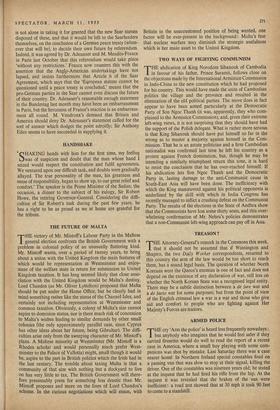TWO WAYS OF FIGHTING COMMUNISM
THE abdication of King Norodom Sihanouk of Cambodia in favour of his father, Prince Suramit, follows close on the objections made by the International Armistice Commission in Indo-China to the new constitution which he had proposed for his country. This would have made the units of Cambodian politics the village and the province and resulted in the elimination of the old political parties. The move does in fact appear to have been aimed particularly at the Democratic Party of Son Ngoc Thanh (it was, apparently, they who com- plained to the Armistice Commission), and, given their extreme left-wing views, it is not surprising that they should have had the support of the Polish delegate. What is rather more serious is that King Sihanouk should have put himself so far in the wrong as to muster a majority against himself in the Com- mission. That he is an astute politician and a firm Cambodian nationalist was confirmed last time he left his country as a protest against French domination, but, though he may be intending a similarly triumphant return this time, it is hard to resist the conclusion that he has over-reached himself. If his abdication lets Son Ngoc Thanh and the Democratic Party in, lasting damage to the anti-Communist cause in South-East Asia will have been done. The inefficiency with which the King manceuvred against his political opponents is underlined by the skill with which in India Congress has recently managed to inflict a crushing defeat on the Communist Party. The results of the elections in the State of Andhra show that the Communists have lost some thirty seats, and this over- whelming confirmation of Mr. Nehru's policies demonstrates that a non-Communist left-wing approach can pay off in Asia.










































 Previous page
Previous page